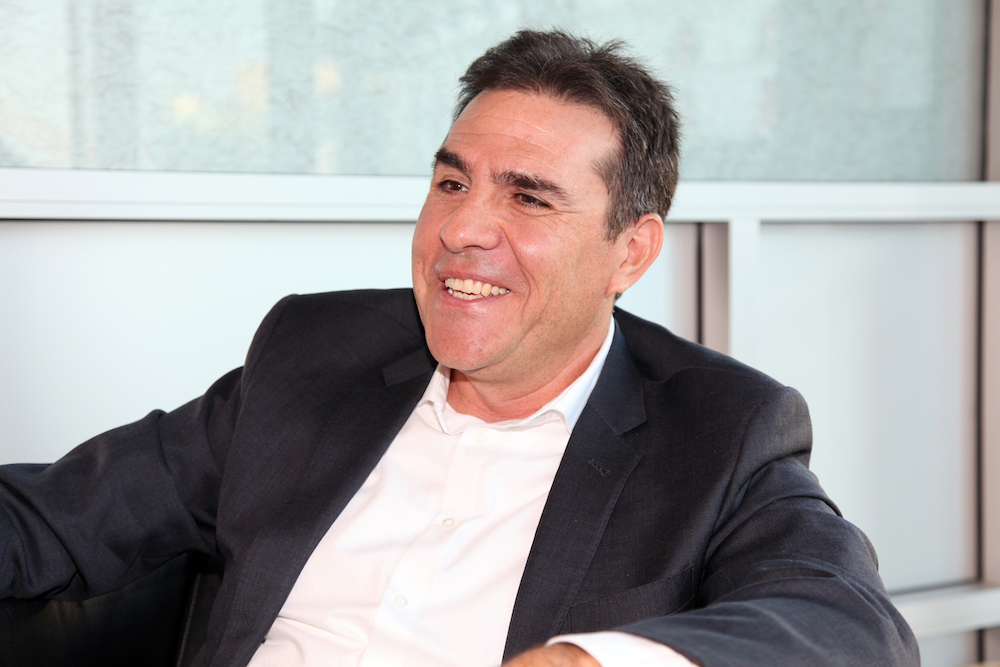
Photo by Aaron Salcido.
Simon Romero is a national correspondent for The New York Times, covering immigration and other issues. Before taking part in a Zócalo/The California Wellness Foundation event titled, “What Are the Social Consequences of Racist Anti-Immigrant Rhetoric?” at the National Center for the Preservation of Democracy in downtown L.A.’s Little Tokyo, he chatted in the green room about living in South America, what he learned from covering Hawai‘i’s recent volcanic eruption, and the surprises that he found in his DNA test.
You’ve lived in Brazil and Venezuela and now you’re back in the States. How long were you abroad?
Altogether I think it was around 18 years, in sort of different stages.
What do you miss most about Brazil?
Just the people. There are certain places that just click for you, and Brazil doesn’t click for everyone. But I loved it. It’s a functioning, sometimes dysfunctional democracy, but it was such a relief to move there from Caracas. My wife is Brazilian, so we have a really strong connection still.
Did you have a mentor or teacher or someone who really influenced your career?
Several people. There was someone when I was just starting out, I met in New Mexico, Alex Shoumatoff, and he used to work for The New Yorker. He wrote some books, about the Amazon and about Congo, just a really wide traveler, and had kind of led this life in different places. And he was writing a book about the Southwest at the time, which is when I met him. My dad met him on a little plane flying over New Mexico, and I was like, ‘Wow, this journalism thing, you could really have an interesting go at things, you can travel and have some adventures.’ So he was a really big influence.
If you could time-travel, where would you go?
I’ve got to confess that I’m a little scared of the future. When I think about it, it’s, unfortunately, with some trepidation. So I think I’d have to choose some point in the past. I’m kind of fascinated by colonial history and I’ve had a long fascination with Brazil and South America. But my family’s origins are in the [U.S.] Southwest and in New Mexico. So it was around the time that this whole experiment crystallized—for good and bad. That might be interesting to witness first-hand.
How far does your family go back in that region?
They go back to the very beginning.
Have you researched them? Are there a lot of records?
Yeah. It’s really funny, with the advent of DNA testing it’s turning up a few surprises, including in my own family, which is pretty interesting.
Could you share one?
So both me and my dad did DNA tests recently. You know, genealogy is like a huge thing in New Mexico. There are extremely well-trained genealogists that guide people on this trip that they’re on. But we both did the test and we both got like a 12 to 14 percent DNA coming from the British Isles. So something happened back there that wasn’t in the record. One of the first armies that came and conquered [the future] New Mexico was made up of mercenaries that came from around what was then the Spanish Empire, so a lot of people from Italy, Greece, and elsewhere.
Where else would you like to live?
I’ve got to say it’s Hawai‘i. I had never been there up until a month and a half ago, and I was just sent there to cover the [volcanic] eruption. That was my first time, and I was just blown away. I was like, “Oh my God, what a cool place.” And it shares a lot with New Mexico, I find, like a really strong native culture, tension between people whose families have been there for a long time and newcomers who’ve only been around for like 150 years or so, the history of how it became part of the United States, and the overthrow of their kingdom and how it was all plotted by American planters. It’s really fascinating. And the place is just lush and beautiful.



